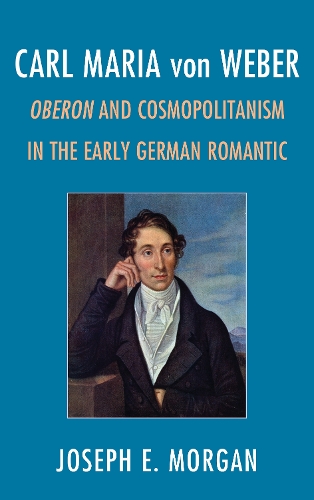
Carl Maria von Weber: Oberon and Cosmopolitanism in the Early German Romantic
(Hardback)
Publishing Details
Carl Maria von Weber: Oberon and Cosmopolitanism in the Early German Romantic
By (Author) Joseph E. Morgan
Bloomsbury Publishing PLC
Rowman & Littlefield Publishers
11th September 2014
United States
Classifications
Tertiary Education
Non Fiction
Composers and songwriters
780.92
Physical Properties
Hardback
328
Width 161mm, Height 233mm, Spine 23mm
567g
Description
Renowned music historian Philipp Spitta has written that of all the German musicians of the 19th century, none has exercised a greater influence over his own generation and that succeeding it than Weber. Spittas statement reflects Webers popularity at the end of the nineteenth 19th centuryboth for his place as a foundational figure of German Romantic opera and for his role in the early German Nationalist movement in music. Indeed, Webers Der Freischtz is still considered the first German Romantic opera, enjoying a place of privilege in the modern operatic repertoire with performances held the world over and at least two cinematic productions. Despite its enormous popularity throughout the 19th nineteenth century, however, Webers swan song, Oberon, has remained separate from the mainstream thrust of our modern understanding of German Romantic opera. In Carl Maria von Weber: Oberon and the Cosmopolitanism in the Early German Romantic, music historian and theorist Joseph E. Morgan reassesses Webers work and aesthetics not just for their influence but also as an expression of the aesthetics and cosmopolitanism that underlay the early Romantic and Nationalist movement in Germany. In a discussion with analyses that features nearly one- hundred musical examples, Morgan tracks the development of Webers musical style across his career. The investigation culminates with Webers last and long-misunderstood work, explaining its thematic and harmonic organization, its stylistic idiosyncrasies, and the tenuous place that it holds on the margins of the operatic canon. The discussion is enhanced and corroborated by frequent attention to correlating developments in other art from the period, including painting, poetry, and literature. This text will be of interest to students, scholars, and connoisseurs wishing to acquire a new insight on the performance, reception, and aesthetics of early German Romantic opera. Further, because of the interdisciplinary nature of the investigation, anyone researching the early Romantic and Nationalist movement in Germany will also certainly find valuable insights in this book.
Author Bio
Joseph E. Morgan is assistant professor of musicology at Middle Tennessee State University. He has also served on the faculties of the New England Conservatory, Brandeis University, and Boston University. His research focuses on the dramatic music, theory and aesthetics of Germany in the early nineteenth century, and he has presented and published articles on E. T. A. Hoffmann, Robert Schumann, Richard Wagner, Giacomo Meyerbeer, and Carl Maria von Weber.
